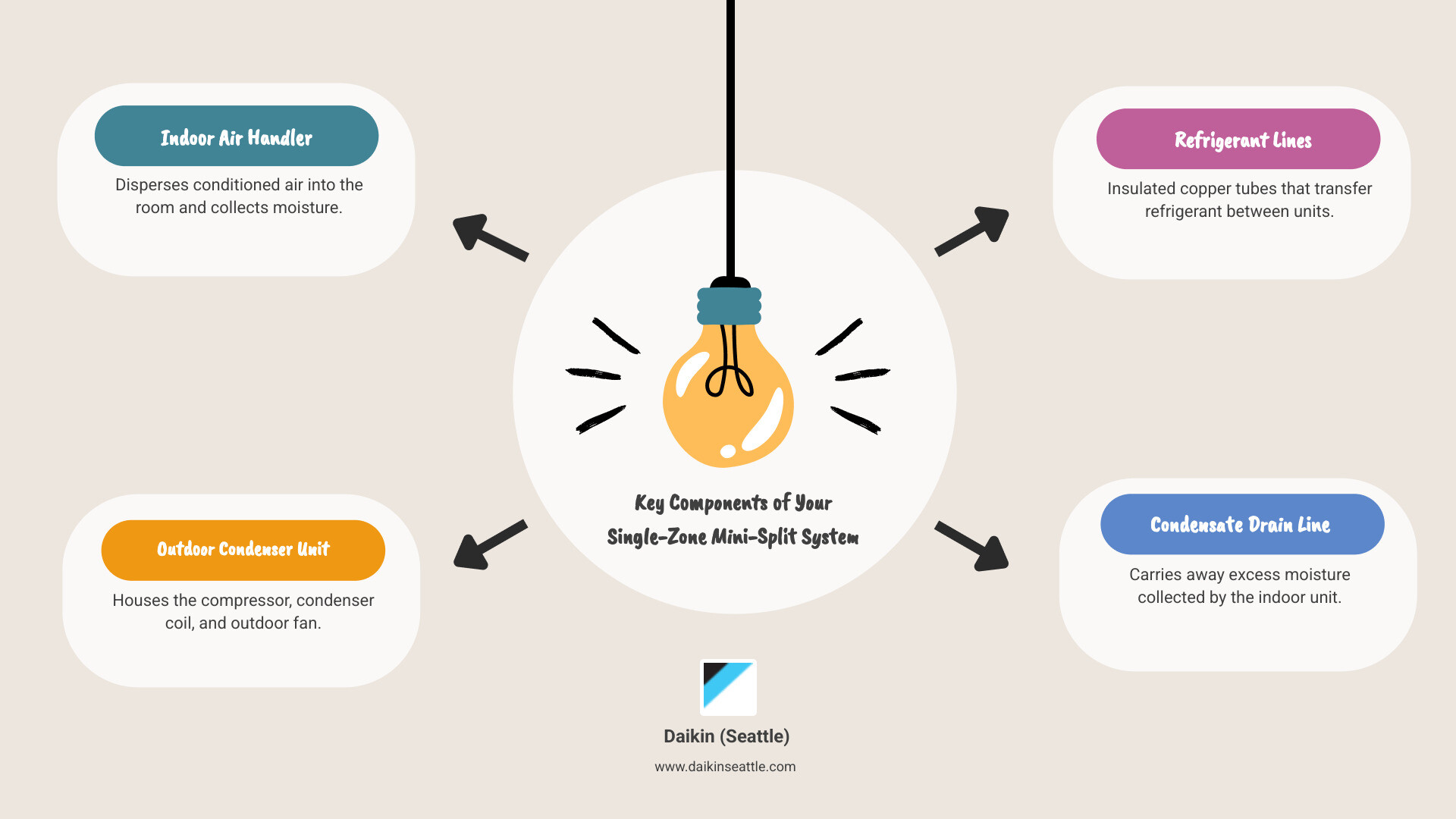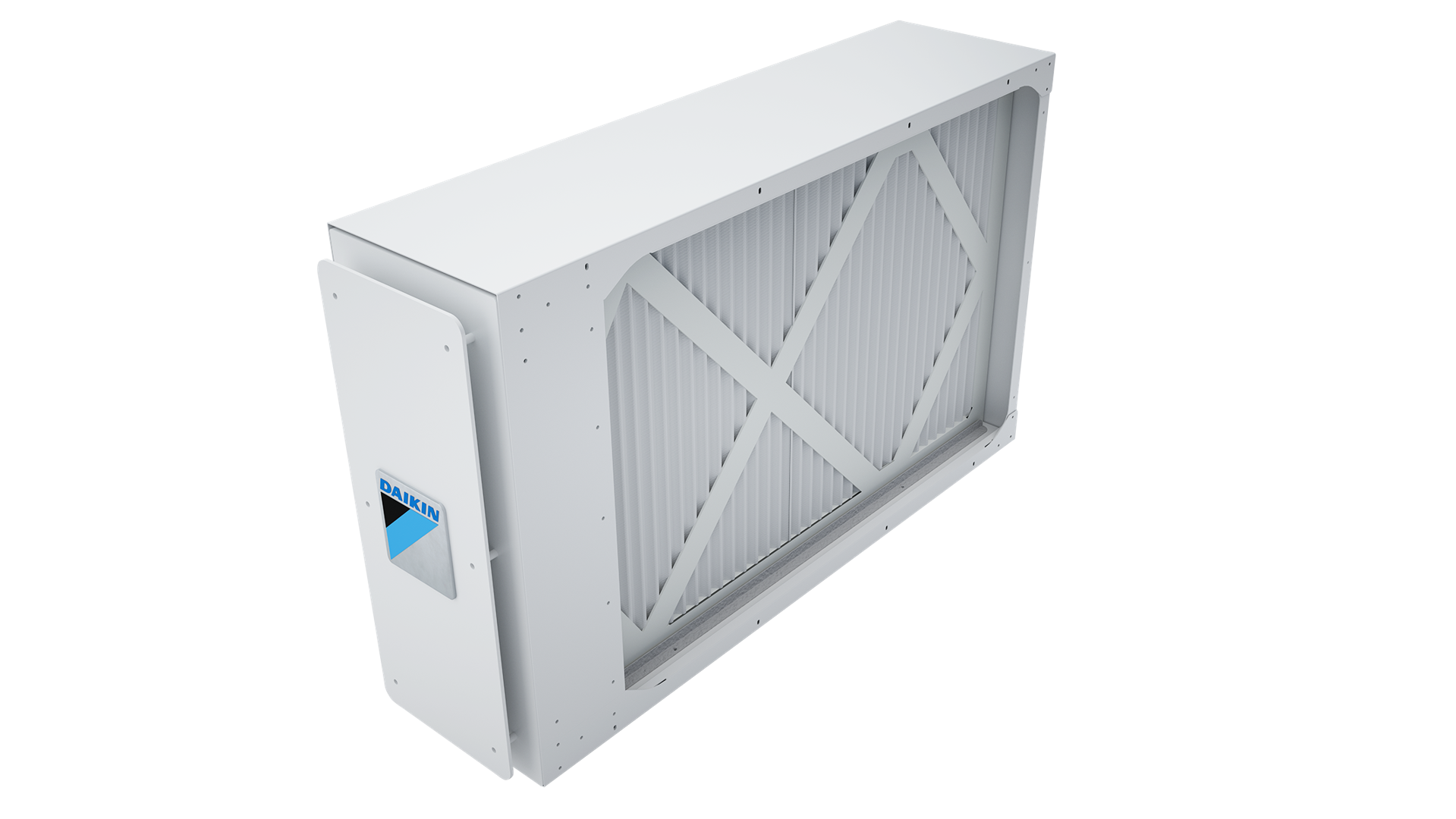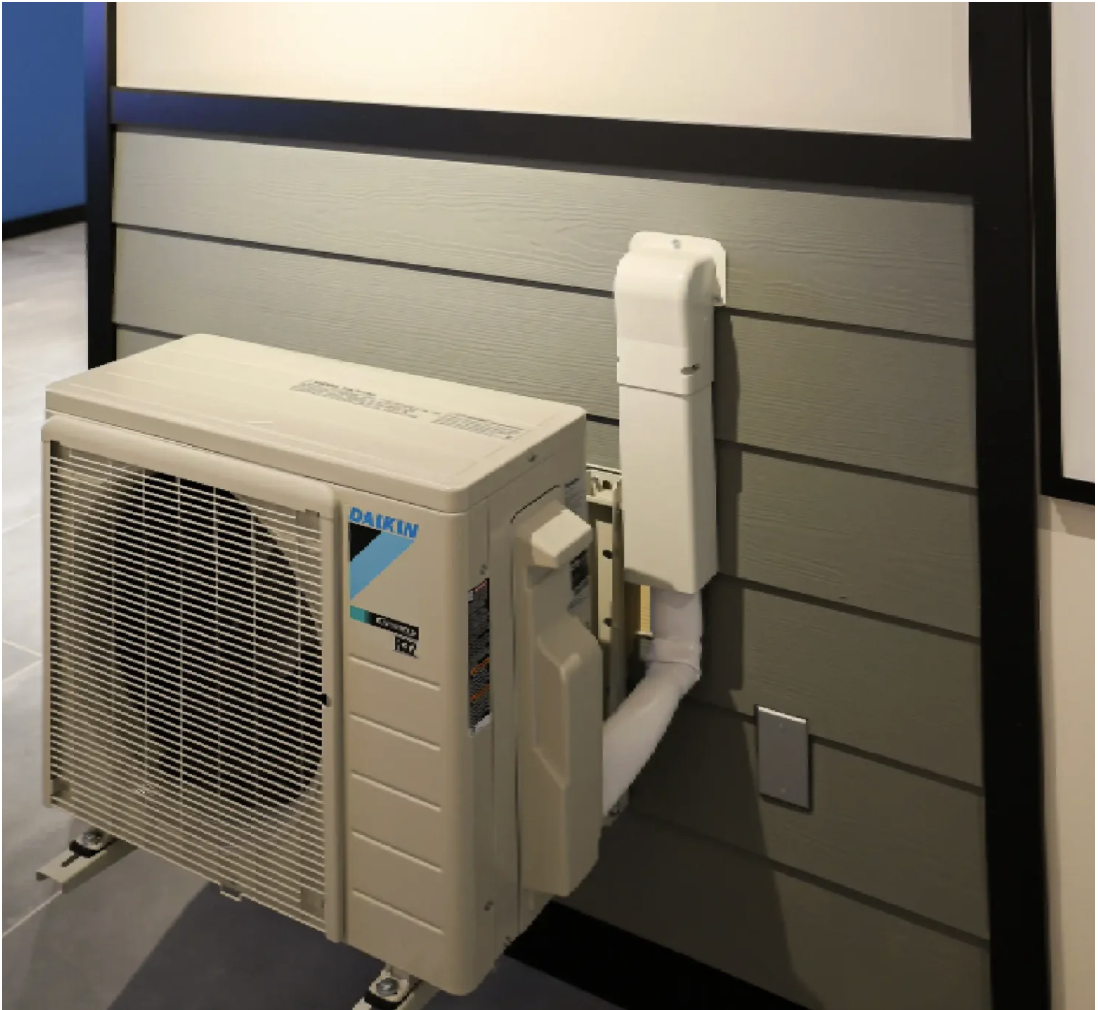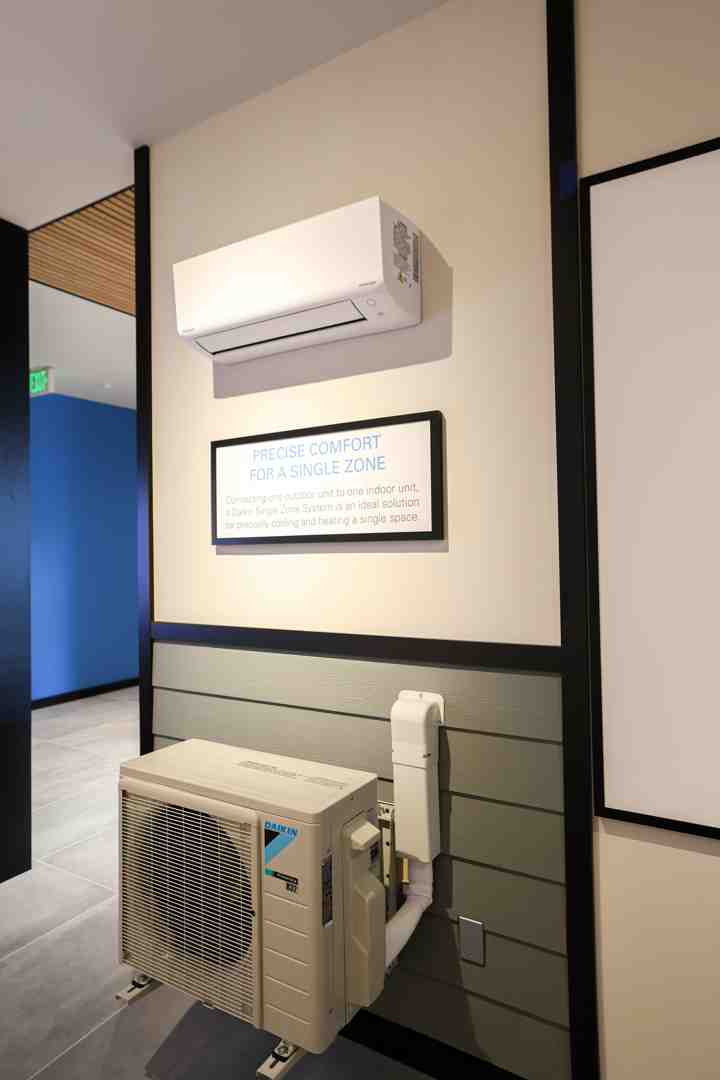Single Zone Mini Split Making Noise In Everett WA: 3 Silent Fixes!
Understanding Your Mini-Split's Sounds: What's Normal and What's Not
If your single zone mini split making noise in everett wa has you concerned, you're not alone. Many homeowners in the Puget Sound area experience unexpected sounds from their systems and wonder whether they're hearing normal operation or a sign of trouble.
Quick Noise Diagnosis Guide:
- Clicking/Popping → Usually normal (plastic expansion from temperature changes)
- Light Gurgling/Swooshing → Normal during defrost cycles in cold weather
- Loud Buzzing/Humming → Potential electrical issue—call a professional
- Hissing/Whistling → Likely refrigerant leak—shut off system and call immediately
- Rattling → Check for loose parts or debris in outdoor unit
- Grinding/Squealing → Failing motor or compressor—needs professional attention
Mini-split systems are engineered for whisper-quiet operation, making them ideal for bedrooms, home offices, and living spaces. When unusual sounds emerge, they often signal that something needs attention—from a simple filter cleaning to a more serious mechanical issue. The Puget Sound's unique climate, with its high humidity and frequent temperature swings, can also influence the sounds your system makes, particularly during defrost cycles or when managing moisture.
Understanding what you're hearing is the first step toward restoring your home's comfort and protecting your investment. Whether you need a quick DIY fix or professional expertise, identifying the source and severity of the noise ensures your system continues delivering efficient, reliable performance year-round.

Decoding Your Mini-Split: A Guide to Common Sounds
When your single zone mini split making noise in everett wa starts speaking up, it's trying to tell you something. Think of these sounds as your system's way of communicating—some are just friendly check-ins, while others are urgent calls for help. Let's walk through what you might be hearing and what it really means.
| Sound | Common Cause | Recommended Action |
|---|---|---|
| Clicking/Popping | Plastic housing expanding/contracting with temperature changes | Monitor (usually normal) |
| Light Gurgling/Swooshing | Refrigerant flow, defrost cycle (especially in cold weather) | Monitor (often normal) |
| Loud Buzzing/Humming | Electrical issues (loose connections, compressor issues, high amperage), loose parts, aging solenoid | Call a Professional |
| Hissing/Whistling | Refrigerant leak, air leaks | Shut off system, Call a Professional Immediately |
| Rattling | Loose parts (bolts, panels), debris (leaves, twigs), fan issues (dirt, broken blades) | Inspect, then Call a Professional if unresolved |
| Grinding/Squealing | Failing motor (fan, compressor), worn bearings, worn parts rubbing | Call a Professional Immediately |
| Banging | Loose ductwork (if applicable to ducted mini-split), severe vibration | Call a Professional |
Normal Sounds vs. Warning Signs
One of the best things about mini-splits is how quietly they run—especially compared to older heating and cooling systems. During normal operation, you'll hear a gentle hum from the fan moving air through your space, and maybe a beep when you adjust the temperature. These sounds are just your system doing its job well.
Some sounds can catch you off guard even though they're perfectly normal. That clicking or popping you hear? It's usually just the plastic housing expanding and contracting as temperatures shift—similar to how your house creaks when it warms up in the afternoon sun. It's nothing to worry about and often becomes less noticeable as your unit settles in.
Here in the Puget Sound, you might also notice light gurgling or swooshing sounds during colder months. This is your mini-split entering its defrost cycle, which melts ice buildup on the outdoor coils. The sound comes from refrigerant flowing through the system and pressure equalizing—a completely normal process that keeps your system running efficiently when temperatures drop.
But then there are sounds that deserve your immediate attention. A loud hissing or whistling is almost always bad news—it typically signals a refrigerant leak. This isn't something to ignore, as it can stress your compressor and lead to complete system failure if left unaddressed. Similarly, a continuous, loud buzzing or humming from your outdoor unit often points to electrical problems, like loose connections or a compressor drawing too much power.
Rattling usually means loose parts or debris have found their way into your system, while grinding or squealing sounds often indicate a failing motor or compressor. Catching these warning signs early can save you from much more expensive repairs down the road.
Common Causes for a Single Zone Mini Split Making Noise in Everett WA
Let's dig into the specific sources behind these sounds, so you know exactly what's happening with your single zone mini split making noise in everett wa.
Indoor unit noises often start with that familiar clicking or popping from thermal expansion we mentioned earlier. If you're hearing a whirring or rattling from inside, check your fan—dirt buildup on the blades or a loose component could be the culprit. A dirty air filter can also restrict airflow, creating whistling or unusual whirring sounds. And while less common indoors, a hissing sound could mean a refrigerant leak in the evaporator coil.
Outdoor unit noises are more varied. A low hum when the fan and compressor are running is completely normal. But a loud, persistent buzz usually points to electrical issues—possibly loose connections, an aging solenoid in heat pump systems, or the compressor handling an unusual electrical load. Rattling from outside often means debris like leaves, twigs, or even small nests have gotten into the fan assembly. It could also be loose bolts or panels vibrating against the unit. That high-pitched hiss or whistle? Strong indicator of a refrigerant leak that needs immediate attention.
Fan issues affect both units. Dirty or unbalanced fan blades create whirring or rattling sounds, while loose blades or obstructions will definitely make themselves heard. Regular cleaning can prevent many of these problems.
Compressor problems are more serious. While a slight hum is normal, loud buzzing, clicking, clunking, or grinding noises suggest electrical issues, internal component problems, or a motor that's starting to fail. The compressor is the heart of your system, so these sounds deserve professional attention.
Refrigerant leaks are critical. That loud hissing or whistling isn't just annoying—it's your system losing the refrigerant it needs to function. This reduces efficiency and can cause irreversible damage to your compressor if not addressed quickly.
Electrical faults like loose connections, capacitor issues, or current problems often show up as humming or buzzing sounds. These are complex issues that require professional diagnosis and repair—not something for DIY troubleshooting.
Even installation issues can cause ongoing noise problems. If your system wasn't securely mounted or properly installed, vibration can create persistent buzzing or humming. Proper installation from the start makes all the difference in long-term quiet operation.
Troubleshooting Your Single Zone Mini Split Making Noise in Everett WA
When your single zone mini split making noise in everett wa starts disrupting your peace and quiet, it's natural to want answers—and fast. The good news? There are several safe, straightforward checks you can perform yourself before picking up the phone. Sometimes the solution is simpler than you might think, and a little detective work can save you time and restore your comfort quickly.

DIY Checks You Can Perform Safely
Before calling in the experts, let's walk through some basic troubleshooting steps that most homeowners can handle safely and confidently. Think of this as your mini-split's first-aid checklist.
Start with the air filter—it's the most common culprit behind unexpected noise. A clogged or dirty filter forces your system to work much harder than it should, which often results in whistling, whirring, or even humming sounds. The restricted airflow makes your mini-split strain, and that strain translates directly into noise. We recommend washing your filters at least once a month, or even more frequently if you have pets or if anyone in your home smokes. This simple habit not only keeps things quiet but also improves your indoor air quality and system efficiency.
Next, take a moment to inspect your outdoor unit. Head outside and look carefully at the condenser. Are there leaves, twigs, grass clippings, or other debris caught in the fan blades or piled around the unit? These obstructions are notorious for causing rattling or crackling sounds as the fan tries to do its job. Before you touch anything, make sure the unit is turned off, then carefully remove any debris you find.
Now check the indoor unit's cover. Sometimes the front panel isn't quite snapped into place properly, which can create a subtle but annoying rattling sound when the fan runs. Gently press around all the edges of the cover to ensure every clip is fully engaged. You'd be surprised how often this simple fix solves the problem.
If you're hearing rattling from the outdoor unit specifically, take a careful look for any loose bolts or panels. We're not suggesting you start disassembling anything, but sometimes an exterior screw works itself loose over time and causes vibration. A gentle visual inspection can reveal obvious issues.
Finally, observe your system during operation. Pay close attention to when the noise happens. Does it occur only during startup? Does it happen in heating mode but not cooling mode? Does it continue constantly or stop when the fan cycles off? These details are incredibly valuable, whether you end up fixing the issue yourself or need to describe the problem to a technician later.
For anything involving electrical components, refrigerant lines, or internal mechanical parts, it's always best to leave it to the professionals. Safety first.
The Impact of the Everett Climate on Mini-Split Noises
Living in the Puget Sound area means your mini-split faces some unique challenges that can directly affect the sounds it makes. Our climate here in Everett is characterized by high humidity, especially during spring and summer, combined with freezing temperatures in winter—and that combination matters more than you might think.
During the colder months, when temperatures regularly dip below freezing, your mini-split's defrost cycle kicks in more frequently. This is when you'll most commonly hear those gurgling or swooshing sounds we mentioned earlier. The system is actively melting ice that has formed on the outdoor coils, and the sound comes from refrigerant flowing and pressure equalizing. This is completely normal and actually a sign your system is working properly to maintain efficiency in our challenging winter weather.
However, if these gurgling sounds become constant or particularly loud, that could indicate something more serious, like low refrigerant levels or a malfunctioning component. The key is distinguishing between occasional defrost-related sounds and persistent problems.
The combination of humidity and frequent temperature swings also means your system sometimes works harder than it would in a more stable climate. Whether it's cooling down quickly on an unexpectedly warm spring day or maintaining consistent warmth during a long, damp winter, your mini-split is managing both temperature and moisture. This consistent demand highlights why proper drainage is so important—blocked condensate lines can lead to gurgling sounds or even water damage.
Our local climate underscores the value of having a robust, well-maintained system that can handle year-round performance demands without complaint. Understanding these regional factors helps you distinguish between the normal sounds of a system adapting to Everett's weather and the warning signs that something genuinely needs attention.
When to Call an HVAC Professional in the Puget Sound
Sometimes, despite our best DIY efforts, a single zone mini split making noise in everett wa needs the skilled hands of a professional. We understand that it can be tempting to troubleshoot everything yourself, but certain symptoms tell us it's time to bring in someone with specialized tools and experience. Ignoring these warning signs doesn't just risk your comfort—it can lead to more significant repairs, reduced efficiency, or even a complete system breakdown.

Signs Your System Needs Expert Attention
When you hear certain sounds coming from your mini-split, they're essentially your system's way of asking for help. A loud humming or buzzing that goes beyond the normal operational hum is one of those calls. This usually points to electrical trouble—maybe loose connections, a compressor drawing too much power, or an aging component that's struggling to keep up. Electrical issues aren't something to tackle on your own, as they require specialized diagnostic equipment and expertise to resolve safely.
Persistent hissing or whistling is another serious red flag. This sound almost always means refrigerant is leaking from your system. Refrigerant isn't just important for cooling and heating—it's a chemical that requires careful, professional handling. When it leaks, your system can't maintain temperature properly, and your compressor faces the risk of severe damage from working too hard without enough refrigerant.
If you're hearing grinding or squealing noises, that's your system telling you something mechanical is wearing out or failing. These sounds typically come from fan motors (either inside or outside), worn bearings, or a compressor that's on its last legs. Running your system when it's making these noises can turn a repairable issue into a complete replacement situation.
Sometimes it's not just about the noise itself—if your system is making unusual sounds and struggling to keep your home comfortable, that combination tells us there's an underlying problem that needs professional diagnosis. And if you ever notice burning smells, lights flickering when your unit runs, or circuit breakers tripping repeatedly, shut everything down immediately and call for help. These are electrical hazards that go beyond system performance—they're safety concerns for your entire home.
When to Call a Pro for a Single Zone Mini Split Making Noise in Everett WA
We genuinely appreciate homeowners who take an active role in maintaining their systems. Cleaning filters and removing debris are valuable tasks that keep your mini-split running smoothly. But there's a clear line between helpful DIY maintenance and repairs that require professional expertise.
Complex mechanical issues involving the compressor, internal motors, or sealed refrigerant lines simply aren't DIY territory. These components require specific diagnostic tools, replacement parts, and technical knowledge and experience. Attempting repairs on these systems without proper experience can actually make things worse, potentially voiding your warranty or creating safety hazards in the process.
Electrical problems fall squarely in the "call a professional" category. Our technicians work safely with high-voltage components and can accurately identify whether the issue is with wiring, capacitors, or the control board. This isn't about doubting your abilities—it's about recognizing that electrical work carries real risks that require professional expertise to handle safely.
Refrigerant leak repair is particularly specialized work. Finding the leak is just the beginning. The repair process involves safely evacuating remaining refrigerant, fixing the breach, pulling a vacuum on the system to remove any moisture or air, and then recharging with the exact amount of refrigerant your system needs. This requires specialized equipment and must be handled by a professional—it's not something that can be improvised.
Beyond just fixing immediate problems, professional service ensures your system's long-term integrity. When a professional technician repairs your mini-split, they're not just addressing the symptom—they're diagnosing the root cause, checking related components, and making sure everything works together as it should. This approach extends your system's lifespan and maintains the efficiency that makes mini-splits such a smart choice for Puget Sound homes. Sometimes the most valuable thing we can do for our systems is knowing when to step back and let the experts take over.
The Power of Prevention: Maintaining a Quiet, Efficient System
Think of your mini-split system like a car—it runs best when you give it regular attention. Proactive care is truly the best defense against a single zone mini split making noise in everett wa. When you invest in preventive maintenance, you're not just avoiding annoying sounds; you're maximizing your system's energy efficiency and significantly extending its lifespan. It's one of those situations where a little effort now saves you from bigger headaches later.
The beauty of prevention is that it addresses problems before they become problems. A loose bolt gets tightened before it causes rattling. A slightly dirty coil gets cleaned before it forces your system to work harder and louder. A minor electrical connection issue gets corrected before it turns into a major buzzing concern. This approach keeps your home comfortable, your energy consumption low, and your peace of mind intact.
Benefits of Regular Professional Maintenance
We've all heard the saying "an ounce of prevention is worth a pound of cure," and nowhere is this truer than with your mini-split system. Regular professional maintenance delivers benefits that go far beyond just keeping things quiet.
Improved performance sits at the top of the list. During routine check-ups, our technicians ensure all components are working in harmony—checking refrigerant levels, cleaning coils, testing electrical connections, and verifying that everything operates as efficiently as the day it was installed. Your system delivers consistent, reliable heating and cooling, season after season.
Noise prevention is where maintenance really shines. Many of the sounds we've discussed—rattling from loose parts, whirring from dirty fans, buzzing from developing electrical issues—can be identified and corrected during routine visits before they ever disturb your peace. Our technicians have experienced eyes and ears; they can spot a fan blade that's starting to accumulate dust, notice a bolt that's working itself loose, or detect the early signs of bearing wear. Catching these minor issues early means your system stays whisper-quiet.
You'll also enjoy improved air quality as a bonus. Clean filters and coils mean the air circulating through your home is free from dust, allergens, and other particles that can affect your family's health and comfort. This is especially important in the Pacific Northwest, where we spend so much time indoors during our rainy seasons.
Long-term reliability comes from catching wear and tear before it snowballs into major breakdowns. A well-maintained system doesn't just run quieter—it lasts longer, protecting the investment you've made in your home's comfort. Regular maintenance helps your mini-split reach and even exceed its expected lifespan.
Perhaps most valuable is the peace of mind that comes from knowing a professional has inspected your system and given it a clean bill of health. You can trust that your mini-split will be there for you, providing reliable comfort through the changing seasons in the Puget Sound—from our chilly, damp winters to those surprisingly warm summer days.

Frequently Asked Questions about Noisy Mini-Splits
It's natural to have questions when your home's quiet comfort is interrupted by unexpected sounds from your mini-split. We hear these questions a lot, and we're here to help you understand what's normal and what might need a closer look.
Why is my new mini-split making a clicking or popping sound?
If you've just had a new mini-split installed, and you hear a clicking or popping sound, don't worry! This is actually quite common, especially during its first few weeks of operation. It's almost always due to the natural expansion and contraction of the plastic housing on your indoor unit. As the unit heats up when heating or cools down when cooling, these materials gently adjust, creating those little sounds. Think of it like the subtle creaks your house makes as it settles, or the quiet sounds of wood furniture adjusting to temperature changes. These sounds are typically harmless, not a sign of a problem, and often become less noticeable over time as your system "breaks in."
Is a gurgling or swooshing sound from my mini-split normal during winter in Everett?
Yes, a light gurgling or swooshing sound from your mini-split during the winter months in Everett is usually completely normal! Our beautiful Puget Sound winters often bring freezing temperatures, which can cause ice to build up on your outdoor unit's coils. To keep your system running efficiently, your mini-split will periodically enter a "defrost cycle." During this cycle, the system temporarily reverses its operation to melt that ice away. The gurgling or swooshing sound you hear is the refrigerant flowing through the system as it performs this important task. It’s a normal, necessary part of how your system maintains peak performance in our local climate. However, if you notice the gurgling is constant, excessively loud, or accompanied by other issues, it could potentially indicate something like low refrigerant levels, and it would be wise to have a professional check it out.
Can a dirty filter cause my mini-split to become louder?
Absolutely! A dirty or clogged air filter is one of the most frequent culprits behind a single zone mini split making noise in Everett WA. When your filter is packed with dust, pet dander, and other particles, it restricts the airflow into your indoor unit. To compensate for this reduced airflow, your mini-split's fan motor has to work much harder and spin faster to pull air through the blockage. This extra effort can lead to a variety of louder noises, such as whistling, whirring, or just a generally increased operational hum. Regularly cleaning or replacing your air filters is a simple, yet incredibly effective, way to keep your system running quietly, efficiently, and to ensure you're breathing cleaner air.
Conclusion: Restore Peace and Quiet to Your Everett Home
A single zone mini split making noise in Everett WA can certainly interrupt the peace of your home. We get it – those unexpected sounds can be quite unsettling! Throughout this guide, we've journeyed through mini-split noises, helping you distinguish between the normal hum of operation and those tell-tale sounds that signal a need for attention. You're now equipped with the knowledge to perform simple DIY checks, and just as importantly, you know when it's time to reach out to the experts for more complex issues like electrical faults or refrigerant leaks.
Proactive care is truly your best friend when it comes to maintaining a quiet and efficient system. Regular maintenance not only helps prevent those annoying noises from popping up but also ensures your mini-split runs smoothly, saving you energy and extending its lifespan.
At Daikin, we believe your home should be a haven of comfort and quiet. That's why our advanced HVAC solutions, including our single-zone mini-splits, are specifically designed with indoor comfort, energy efficiency, and sustainability in mind. With features like our innovative inverter technology, Daikin systems deliver incredibly quiet and consistent performance, ensuring your home stays perfectly comfortable without the distracting sounds.
By understanding the "language" your mini-split speaks and taking the right steps, you can confidently restore tranquility to your Everett home. Don't let a noisy system disrupt your peace; let us help you enjoy the superior comfort and efficiency your Daikin mini-split is meant to provide.

Schedule a Visit

your individual indoor comfort needs

products firsthand

with an authorized Daikin Dealer
.webp)

.webp)

.svg)
